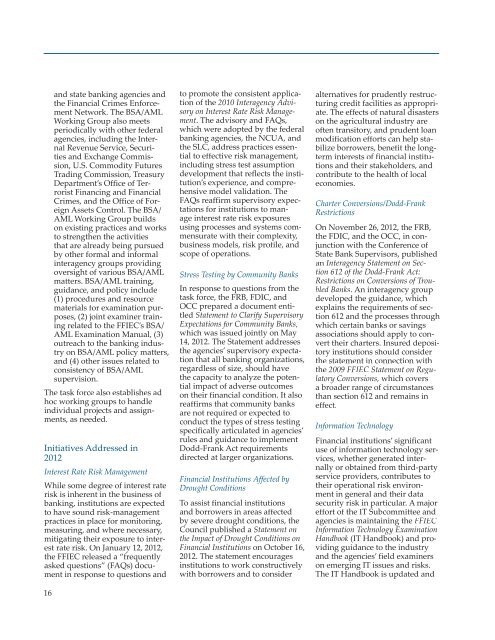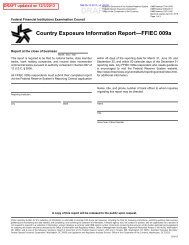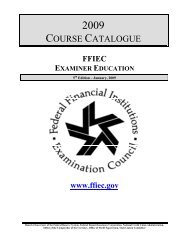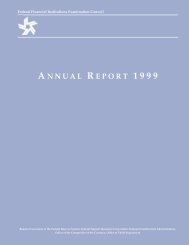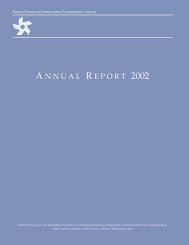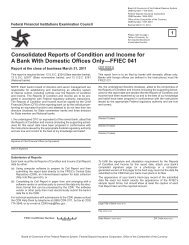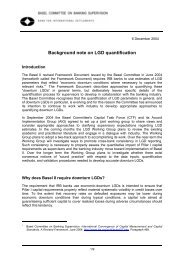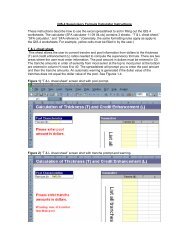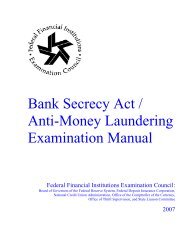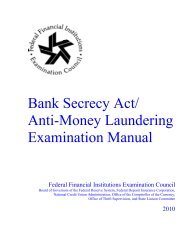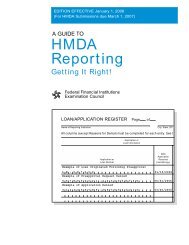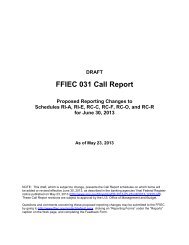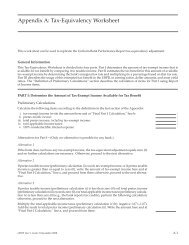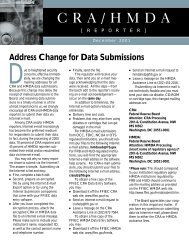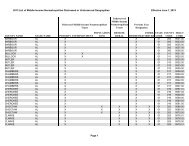Annual Report 2012 - ffiec
Annual Report 2012 - ffiec
Annual Report 2012 - ffiec
Create successful ePaper yourself
Turn your PDF publications into a flip-book with our unique Google optimized e-Paper software.
and state banking agencies and<br />
the Financial Crimes Enforcement<br />
Network. The BSA/AML<br />
Working Group also meets<br />
periodically with other federal<br />
agencies, including the Internal<br />
Revenue Service, Securities<br />
and Exchange Commission,<br />
U.S. Commodity Futures<br />
Trading Commission, Treasury<br />
Department’s Office of Terrorist<br />
Financing and Financial<br />
Crimes, and the Office of Foreign<br />
Assets Control. The BSA/<br />
AML Working Group builds<br />
on existing practices and works<br />
to strengthen the activities<br />
that are already being pursued<br />
by other formal and informal<br />
interagency groups providing<br />
oversight of various BSA/AML<br />
matters. BSA/AML training,<br />
guidance, and policy include<br />
(1) procedures and resource<br />
materials for examination purposes,<br />
(2) joint examiner training<br />
related to the FFIEC’s BSA/<br />
AML Examination Manual, (3)<br />
outreach to the banking industry<br />
on BSA/AML policy matters,<br />
and (4) other issues related to<br />
consistency of BSA/AML<br />
supervision.<br />
The task force also establishes ad<br />
hoc working groups to handle<br />
individual projects and assignments,<br />
as needed.<br />
Initiatives Addressed in<br />
<strong>2012</strong><br />
Interest Rate Risk Management<br />
While some degree of interest rate<br />
risk is inherent in the business of<br />
banking, institutions are expected<br />
to have sound risk-management<br />
practices in place for monitoring,<br />
measuring, and where necessary,<br />
mitigating their exposure to interest<br />
rate risk. On January 12, <strong>2012</strong>,<br />
the FFIEC released a “frequently<br />
asked questions” (FAQs) document<br />
in response to questions and<br />
16<br />
to promote the consistent application<br />
of the 2010 Interagency Advisory<br />
on Interest Rate Risk Management.<br />
The advisory and FAQs,<br />
which were adopted by the federal<br />
banking agencies, the NCUA, and<br />
the SLC, address practices essential<br />
to effective risk management,<br />
including stress test assumption<br />
development that reflects the institution’s<br />
experience, and comprehensive<br />
model validation. The<br />
FAQs reaffirm supervisory expectations<br />
for institutions to manage<br />
interest rate risk exposures<br />
using processes and systems commensurate<br />
with their complexity,<br />
business models, risk profile, and<br />
scope of operations.<br />
Stress Testing by Community Banks<br />
In response to questions from the<br />
task force, the FRB, FDIC, and<br />
OCC prepared a document entitled<br />
Statement to Clarify Supervisory<br />
Expectations for Community Banks,<br />
which was issued jointly on May<br />
14, <strong>2012</strong>. The Statement addresses<br />
the agencies’ supervisory expectation<br />
that all banking organizations,<br />
regardless of size, should have<br />
the capacity to analyze the potential<br />
impact of adverse outcomes<br />
on their financial condition. It also<br />
reaffirms that community banks<br />
are not required or expected to<br />
conduct the types of stress testing<br />
specifically articulated in agencies’<br />
rules and guidance to implement<br />
Dodd-Frank Act requirements<br />
directed at larger organizations.<br />
Financial Institutions Affected by<br />
Drought Conditions<br />
To assist financial institutions<br />
and borrowers in areas affected<br />
by severe drought conditions, the<br />
Council published a Statement on<br />
the Impact of Drought Conditions on<br />
Financial Institutions on October 16,<br />
<strong>2012</strong>. The statement encourages<br />
institutions to work constructively<br />
with borrowers and to consider<br />
alternatives for prudently restructuring<br />
credit facilities as appropriate.<br />
The effects of natural disasters<br />
on the agricultural industry are<br />
often transitory, and prudent loan<br />
modification efforts can help stabilize<br />
borrowers, benefit the longterm<br />
interests of financial institutions<br />
and their stakeholders, and<br />
contribute to the health of local<br />
economies.<br />
Charter Conversions/Dodd-Frank<br />
Restrictions<br />
On November 26, <strong>2012</strong>, the FRB,<br />
the FDIC, and the OCC, in conjunction<br />
with the Conference of<br />
State Bank Supervisors, published<br />
an Interagency Statement on Section<br />
612 of the Dodd-Frank Act:<br />
Restrictions on Conversions of Troubled<br />
Banks. An interagency group<br />
developed the guidance, which<br />
explains the requirements of section<br />
612 and the processes through<br />
which certain banks or savings<br />
associations should apply to convert<br />
their charters. Insured depository<br />
institutions should consider<br />
the statement in connection with<br />
the 2009 FFIEC Statement on Regulatory<br />
Conversions, which covers<br />
a broader range of circumstances<br />
than section 612 and remains in<br />
effect.<br />
Information Technology<br />
Financial institutions’ significant<br />
use of information technology services,<br />
whether generated internally<br />
or obtained from third-party<br />
service providers, contributes to<br />
their operational risk environment<br />
in general and their data<br />
security risk in particular. A major<br />
effort of the IT Subcommittee and<br />
agencies is maintaining the FFIEC<br />
Information Technology Examination<br />
Handbook k (IT Handbook) and providing<br />
guidance to the industry<br />
and the agencies’ field examiners<br />
on emerging IT issues and risks.<br />
The IT Handbook is updated and


